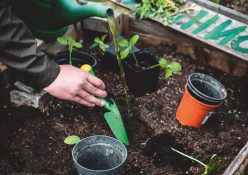Every year, the Cape Town International Convention Centre explodes with creativity as it plays host to the Investec Cape Town Art Fair. This year’s event, happening from 14 to 16 February, will be no exception. Whether you’re a collector or viewer, the annual fair gives a thrilling glimpse at the plethora of talent our continent has to offer
Investec Cape Town Art Fair’s annual section ‘Tomorrows/Today’, aimed at shining a light on emerging and under-represented artists, will undergo a fresh interpretation for 2020. Here you can explore African talent that has not always been included in the mainstream. Under the curation of Luigi Fassi, the artistic director of MAN-Contemporary Art Museum in Nuoro, Italy, along with Cape Town’s Michaelis Gallery curator Nkule Mabaso, expect to discover exciting new talent. ‘The “Tomorrows/Today” section is a deliberate effort to introduce artists from other regions and support exceptional talent today as they become tomorrow’s great artists,’ explains Nkule. For the investor, it also represents the opportunity to snap up pivotal pieces by artists before interest in their names piques, making their artworks unattainable. ‘This publicity can go a long way towards social interest in their career,’ says Nkule. But it is not all about buying – the ‘Tomorrow/ Today’ section is also a celebration of the growing impact contemporary African art is having globally. ‘You can expect encounters with African artists who are currently entering into the focus of institutions and collectors on a global level,’ explains Luigi, who adds that you can enjoy some non-African piecesof rising global importance, too. ‘I hope to achieve an inspiring overview of emerging artists where even well-travelled, sharp collectors can come across artists and works they didn’t know before.’
DISRUPT YOUR WORLD VIEW
For centuries, exhibited art has largely represented a Western-centric world view; showcases such as Investec Cape Town Art Fair disrupt this. ‘What is exciting is the way in which contemporary African artists are interpreting history and global transformations from a non-Western perspective, delinking our present from a Western-centred gaze,’ explains Luigi, who sees the Cape Town-based fair as critical for precisely this reason. ‘There is still a lot of work to be done to further enhance the presence of contemporary African art in the global scenario. It’s key for fairs showcasing art from Africa to act as filters, giving visibility to the best artists, works and experiences as presented by qualified galleries.’ Cécile Fakhoury, founder of Côte d’Ivoire’s gallery-to-watch Galerie Cécile Fakhoury, couldn’t agree more. ‘What’s new in contemporary African art today is its relationship to the world,’ she says. ‘There is a growing interest in the art scene and artists are expressing viewpoints that are more universal and global than solely African; they are creating a dynamic and challenging space to think and create.’

ENGAGE IN STIMULATING DISCUSSIONS
This year’s ‘Talks Programme’, a series of panel discussions, are being coordinated by Tumelo Mosaka and will see experts unpack a range of topics. Having held positions at the Brooklyn Museum and Krannert Art Museum in Illinois, Tumelo hopes the ‘Talks Programme’ will shine a light on the challenges facing African artists and galleries currently. ‘The list of topics will touch on arts philanthropy in Africa, museums of the future and artists’ dialogues,’ says Tumelo. ‘We have a broad list of specialists who will present very provocative and challenging perspectives about our arts industries.
‘The “Talks Programme” is intended to bring to light important issues currently under discussion in the field. It provides an opportunity for you to engage with some of the experts who are defining the field. Art is alive and it affects us all very differently.’ something unexpected … and exciting Tumelo is also involved in the curation of this year’s ‘Cultural Platforms’ section, intended to highlight the work of non-profit organisations and collections. ‘The non-profit sector is an important counter-balance to what could be conceived as the ‘taste of the day’, driven by financial interests,’ says Tumelo.
‘It allows for greater risk-taking because the artist is freed from commercial sales and can be selfish about their intention. Commercial success does not always mean artistic freedom, so balancing the two can be a personal struggle for artists.’ With this freedom comes opportunity for artists to become highly experimental, meaning you can expect the unexpected for this section of the fair. ‘Within the “Cultural Platforms”, I would like to see an experimental approach driven by showcasing new approaches to art practice,’ says Tumelo. ‘I am interested in works that really defy the traditional art-fair presentation.’
investeccapetownartfair.co.za
 Subscribe to Livingspace, to receive monthly updates on all decor trends.
Subscribe to Livingspace, to receive monthly updates on all decor trends.







